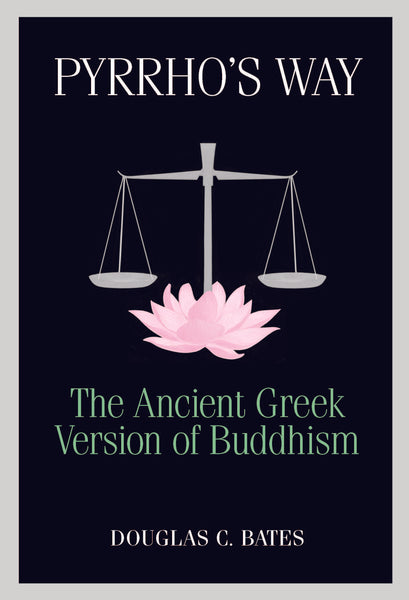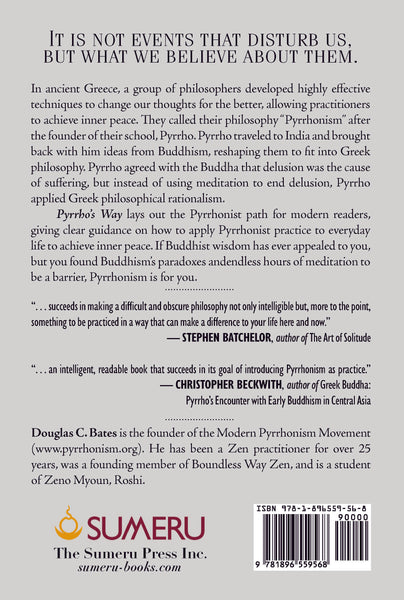Pyrrho's Way
ISBN 978-1-896559-56-8 paperback
322 pages, print, 6 x 9 inches, June 2020
Pyrrho, Pyrrhonist Philosophy, Zen Buddhist Practice, Taoism
PYRRHO'S WAY: The Ancient Greek Version of Buddhism
by Douglas C. Bates
It is not events that disturb us, but what we believe about them.
In ancient Greece, a group of philosophers developed highly effective techniques to change our thoughts for the better, allowing practitioners to achieve inner peace. They called their philosophy “Pyrrhonism” after the founder of their school, Pyrrho. Pyrrho traveled to India and brought back with him ideas from Buddhism, reshaping them to fit into Greek philosophy. Pyrrho agreed with the Buddha that delusion was the cause of suffering, but instead of using meditation to end delusion, Pyrrho applied Greek philosophical rationalism.
Pyrrho’s Way lays out the Pyrrhonist path for modern readers, giving clear guidance on how to apply Pyrrhonist practice to everyday life to achieve inner peace. If Buddhist wisdom has ever appealed to you, but you found Buddhism’s paradoxes and endless hours of meditation to be a barrier, Pyrrhonism is for you.
Douglas C. Bates is the founder of the Modern Pyrrhonism Movement (www.pyrrhonism.org). He has been a Zen practitioner for over 25 years, was a founding member of Boundless Way Zen, and is a student of Zeno Myoun, Roshi.
Praise for Pyrrho's Way
“…succeeds in making a difficult and obscure philosophy not only intelligible but, more to the point, something to be practiced in a way that can make a difference to your life here and now.” — STEPHEN BATCHELOR, author of The Art of Solitude
“…an intelligent, readable book that succeeds in its goal of introducing Pyrrhonism as practice.” — CHRISTOPHER BECKWITH, author of Greek Buddha: Pyrrho’s Encounter with Early Buddhism in Central Asia
Douglas Bates on the Academy of Reason podcast
and on the Imperfect Buddha podcast
https://open.spotify.com/episode/1GyewnH2EhjdWH7YtEKm3q
and in this online salon about Pyrrhonism
Matt Bianca reviews (or doesn't) Pyrrho's Way here: https://thegentlelaw.substack.com/p/book-review-pyrrhos-way
Contents
Preface
Timeline
Book I Introduction
1 Pyrrho’s Journey to the East
2 Eudaimonia
3 The Allegory of the Cave
4 Dukkha
Book II A Modern Outline of Pyrrhonism
5 When People Search for Something
6 Overview of Pyrrhonism
7 The Goal of Pyrrhonism
8 The Pyrrhonist Concept of Signs
9 The Modes of Epoché
10 The Ten Modes of Aenesidemus
11 The Five Modes of Agrippa
12 The Pyrrhonist Maxims
13 Can Pyrrhonists Question What Is Said by the Dogmatists?
14 The Basis of Pyrrhonist Criticism of Dogmatism
15 Does a Criterion of Truth Exist?
16 The Problem of Induction
17 The Criterion of Action
18 Pyrrhonist Ethics
19 Is Anything Inherently Good, Bad, or Indifferent?
20 Is There a Techne of Living?
21 Concluding Comments
Book III Pyrrhonism and Other Philosophies
22 Where Pyrrhonism Fits in Hellenistic Philosophy
23 Pyrrhonism and Buddhism
24 Pyrrhonism and Democritean Philosophy
25 Pyrrhonism and Cyrenaicism
26 Pyrrhonism and Protagorean Philosophy
27 Pyrrhonism and Academic Skepticism
28 Pyrrhonism and Taoism
29 Pyrrhonism and Heraclitean Philosophy
30 Pyrrhonism and Science
31 Pyrrhonism and Postmodernism
Book IV Practicing Pyrrhonism
32 The Cure by Argument
33 Styles of Pyrrhonist Practice
34 Beliefs and Appearances
35 Against Aristocles of Messene
36 Is There a Self?
37 Meditation
38 Confusions About Pyrrhonist Ethics
39 Moral Beliefs
40 Pyrrhonist Decision-Making
41 Pyrrhonism and Religion
42 Pyrrhonism and Politics
43 Tips on Pyrrhonist Practice
Book V Pyrrhonism Now
44 Pyrrhonism as a Path to Buddhism
45 Pyrrhonism and the Art of Motorcycle Maintenance
46 The Stoics
47 Are We There Yet?
Book VI The Emperor and the Pyrrhonist
48 Sextus Empiricus of Chaeronea
49 Marcus Aurelius on Sextus Empiricus
50 Pyrrhonist Influences on Marcus Aurelius
Appendix
Appendix 1 Translation of the Meditations
Acknowledgments








